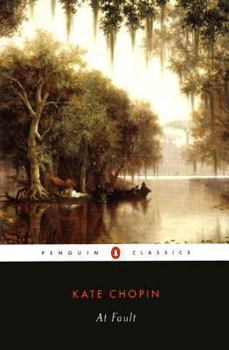At Fault (Penguin Classics)
Select Format
Select Condition 
Book Overview
Th r se Lafirme, a beautiful and resourceful Creole woman, is widowed at age thirty-two and left alone to run her Louisiana plantation. When Th r se falls in love with David Hosmer, a divorced businessman, her strong moral and religious convictions make it impossible for her to accept his marriage proposal. Her determined rejection sets the two on a tumultuous path that involves Hosmer's former wife, Fanny. At Fault is both romantic and filled with stark realism-a love story that expands to address the complex problem of balancing personal happiness and social duty-set in the post-Reconstruction South against a backdrop of economic devastation and simmering racial tensions. Written at the beginning of her career, At Fault parallels Chopin's own life and introduces characters and themes that appear in her later works, including The Awakening . For more than seventy years, Penguin has been the leading publisher of classic literature in the English-speaking world. With more than 1,700 titles, Penguin Classics represents a global bookshelf of the best works throughout history and across genres and disciplines. Readers trust the series to provide authoritative texts enhanced by introductions and notes by distinguished scholars and contemporary authors, as well as up-to-date translations by award-winning translators.
Format:Paperback
Language:English
ISBN:0142437026
ISBN13:9780142437025
Release Date:February 2002
Publisher:Penguin Classics
Length:177 Pages
Weight:0.40 lbs.
Dimensions:8.0" x 5.5" x 0.8"
Age Range:18 years and up
Grade Range:Grade 12 and higher
Customer Reviews
1 rating
At Fault by Kate Chopin
Published by Thriftbooks.com User , 16 years ago
Because I loved The Awakening, I decided to read one of Chopin's lesser-known novels, At Fault, which is set in late nineteenth century Louisiana. This novel deals with many issues, such as religion, divorce, alcoholism, and violence, in a relatively short length of text. The main characters are Therese and David, who meet through business and fall in love. David is a divorced Unitarian, and Therese, a widowed Catholic. Because of David's religion and divorce, Therese declines his eventual marriage proposal, and instead convinces him to return to his estranged ex-wife, Fanny--which proves tragic and disastrous. There are also some tertiary, though equally important characters in the story--Melicent and Gregoir, for one. Like Therese and David, they have a relationship of sorts, but Melicent will not condescend to Gregoir's advances because they are of a different class. What this novel deals quite successfully with, if such can be done, is that in our society (and especially back during the late 19th century) we are often told that we should bridle our passions lest they get the best of us. However, there are just as many consequences, and perhaps many more, for NOT going with our passions and our feelings. In containing our love for others and attempting to conduct life as if such feelings do not exist, is like a form of death and destruction--akin to William Blake's sentiment that "he who desires and acts not breeds pestilence." Once Therese realizes that David's returning to his ex-wife has caused much untold suffering--she has sort of a "Dark Night of the Soul" moment where she asks herself, over and over again, "Was I right? Was I right?" This was indeed the turning point in the novel, where I believe that Therese began to question what she knows, and what she thought she believed about what is "right." I will leave the rest of the story as a mystery for those who wish to not have it spoiled. I highly recommend this short, yet exquisitely written book.







